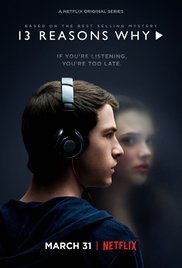By Sasha Narang ’18
If the names Clay Jenson and Hannah Baker don’t sound familiar to you by now, it’s safe to say that you’ve probably been living under a rock. The newly-released, popular Netflix series based off of Jay Asher’s teen novel, “Thirteen Reasons Why,” has caused students to question whether the story’s message promotes a friendlier school community that will lead to a decrease in teenage suicide or a negative one that “glorifies” it.
I believe “Thirteen Reasons Why” was written with the intention of encouraging teens to embrace a school climate that promotes a healthy environment in which all of its members are happy; however, the book’s approach to communicating this message is what has stirred up so much controversy within school districts throughout the country.
Some have interpreted Asher’s message as a “glorification” of suicide when Hannah Baker, the protagonist, speaks of the “thirteen reasons” that led her to suicide through a series of tapes, shares her story. This has raised the concern that it could encourage “copycat suicides.”
“Thirteen Reasons Why” is a devastating and eye-opening depiction of the severe impact that one’s words can have on others. To me, it seems that Asher wrote this novel not to encourage teenagers to give up, but instead to show society our current reality for students who are victims of bullying; that if we do not make a change, the current suicide rates will most likely remain, or perhaps increase.
Ultimately, no one is in the right place to say whether or not the story could have these dangerous consequences. However, I hope the book will encourage students to be more cautious of the things they do and say, hopefully leading to a decline in suicide among students.
I think restricting students from reading the book at Staples would be a poor decision, as the overall message is being misinterpreted by the School District. Although they are concerned, banning the book will create even more controversy. Students may argue that the story is benefitting society, rather than creating negativity.
Although it should not necessarily be required reading, many students will benefit from following Hannah Baker’s story in “Thirteen Reasons Why.”













































